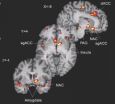(Press-News.org) An Australian study reveals that people with the rare genetic disorder known as Prader-Willi Syndrome may have an impaired autonomic nervous system. This discovery opens up a new way of looking at the insatiable appetite experienced by all sufferers, as well as their very high risk of cardiovascular disease.
The autonomic nervous system controls our inner organs, including our gut, heart, liver and blood vessels. It is a finely tuned, dynamic system, responding moment-by-moment to the body's needs.
Researchers from Sydney's Garvan Institute of Medical Research, including Drs Alexander Viardot and Lisa Sze, Professor Lesley Campbell and Louise Purtell, undertook meal studies, comparing 10 adults with Prader-Willi Syndrome with 11 healthy matched obese people and 9 healthy lean people.
Their findings, now published online in the international journal Clinical Endocrinology, showed that heart rate variability, an indicator of autonomic nervous system function, was not normal in people with Prader-Willi Syndrome.
In a healthy person, the time between one heartbeat and the next varies considerably during a meal because the autonomic nervous system is very actively regulating the body's response to food and blood flow.
In people with Prader-Willi Syndrome, the study found, heartbeats were far too regular after a meal. This allowed the researchers to infer autonomic nervous system impairment.
"This is the first study to show that the response of the autonomic nervous system to food intake is abnormal in Prader-Willi Syndrome," said endocrinologist Dr Alex Viardot, one of the principal investigators.
"A range of abnormalities we see in Prader-Willi patients could be linked to it – including how the body secretes appetite suppressing gut hormones, and also controls appetite through the central nervous system."
"We believe the finding introduces a fresh perspective on the pathophysiology of this disease, potentially leading to alternative treatments in the future."
Study leader Professor Lesley Campbell agreed, emphasising the fact that the researchers matched obese people very closely with Prader-Willi patients in order to establish exactly what is intrinsic to Prader-Willi. "As a result of that close matching, we believe we are seeing the actual defect induced by the syndrome," she said.
"The autonomic nervous system is very hard to assess – and previous Prader-Willi studies have tended to look at the grosser autonomic nervous functions, such as pupil function, which has its limitations."
"To measure a very finely regulated thing like heart rate is a sensitive and reproducible way of measuring autonomic nervous function. This is the benefit of our study – it's a reliable test."
###
ABOUT GARVAN
The Garvan Institute of Medical Research was founded in 1963. Initially a research department of St Vincent's Hospital in Sydney, it is now one of Australia's largest medical research institutions with over 600 scientists, students and support staff. Garvan's main research areas are: Cancer, Diabetes & Obesity, Immunology and Inflammation and Neuroscience. Garvan's mission is to make significant contributions to medical science that will change the directions of science and medicine and have major impacts on human health. The outcome of Garvan's discoveries is the development of better methods of diagnosis, treatment, and ultimately, prevention of disease.
MEDIA ENQUIRIES
Alison Heather
Science Communications Manager
Garvan Institute of Medical Research
+61 2 9295 8128
+61 434 071 326
a.heather "at" garvan.org.au END
A new way of looking at Prader-Willi Syndrome
2012-11-15
ELSE PRESS RELEASES FROM THIS DATE:
Scientists show protein-making machinery can switch gears with a small structural change process, which may have implications for immunity and cancer therapy, compared to the movie The Transformers
2012-11-15
JUPITER, FL, November 15, 2012 – For the past several years, Min Guo, an assistant professor at The Scripps Research Institute, has focused on the intricate actions of an ancient family of catalytic enzymes that play a key role in translation, the process of producing proteins.
These complex enzymes are a group of fundamental molecules that make building blocks for protein production. Present in every cell, these enzymes—known as aminoacyl-transfer RNA synthetases (tRNA synthetases)—select the proper amino acid and assign them to transfer RNAs to make a protein in the ...
Genetics point to serious pregnancy complication
2012-11-15
New research at the University of Adelaide has revealed a genetic link in pregnant mums - and their male partners - to pre-eclampsia, a life-threatening complication during pregnancy.
Pre-eclampsia involves high blood pressure and fluid retention and can cause damage to the kidneys and liver. About 7% of pregnancies are affected by pre-eclampsia.
In a paper now online in the journal Placenta ahead of print publication, the researchers say they have found a genetic variant involving the AGT2R gene, which may predispose women to pre-eclampsia.
However, the genetic variant ...
VTT developes future energy solutions in cooperation with residents
2012-11-15
VTT is developing future energy solutions in cooperation with residents of the new research hotel in Otaniemi. The hotel offers rented furnished accommodation to visiting foreign research scientists, who will move in to the new building in November. The four-storey research hotel is located at Otaranta 4 and overlooks the sea. The hotel has 52 rooms ranging from 30 to 80 square metres, with common areas and facilities on each floor.
Residents' energy behaviour matters – up to a fourfold difference in consumption
Research Professor Miimu Airaksinen says that the role ...
Mercury poisoning ruled out as cause of Tycho Brahe's death
2012-11-15
In 2010, Tycho Brahe was exhumed from his grave in Prague, an event which received extensive international media coverage. Since then, a Danish-Czech team of researchers has been working to elucidate the cause of Tycho Brahe's death. The results of this intensive work now make it possible to rule out mercury poisoning as a cause of death.
For over four hundred years, Tycho Brahe's untimely death has been a mystery. He died on 24 October 1601 only eleven days after the onset of a sudden illness. Over the centuries, a variety of myths and theories about his death have arisen. ...
Study finds asthma is not linked to lower educational attainment
2012-11-15
Research led by Queen Mary, University of London has found that having asthma is not linked to poorer scores in national school examinations. In contrast, ethnicity and social deprivation were associated with poorer educational outcomes in the study, published in the journal PLOS ONE.
Long-term conditions in childhood – of which asthma is now the most common – may have a major impact on educational performance. However, in one of the world's first studies to link health, housing, benefits and educational data in over 12,000 children, researchers from Queen Mary, University ...
Structure of enzyme unravelled providing basis for more accurate design of chemotherapeutic drugs
2012-11-15
Cambridge, MA, November 15, 2012 – A group of researchers at the University of California, Berkeley have for the first time described the structure of the active site core of topoisomerase II alpha, an important target for anti-cancer drugs.
The type II topoisomerases are important enzymes that are involved in maintaining the structure of DNA and chromosome segregation during both replication and transcription of DNA. One of these enzymes, topoisomerase II alpha, is involved in the replication of DNA and cell proliferation, and is highly expressed in rapidly dividing ...
When the going gets tough, the tough get... more relief from a placebo?
2012-11-15
ANN ARBOR, Mich. — Are you good at coping when life gets tough? Do people call you a straight-shooter? Will you help others without expecting anything in return?
Those personality traits might do more than help you win a popularity contest. According to new University of Michigan-led neuroscience research, those qualities also might make you more likely to get pain relief from a placebo – a fake medicine.
And, the researchers show, it's not just your mind telling you the sham drug is working or not. Your brain's own natural painkiller chemicals may actually respond ...
Oxytocin keeps flirting folks at arm's length
2012-11-15
Flirting brings women and men closer. But the "social distance" ensures that they will keep a certain spatial distance from each other. Researchers under the leadership of the University of Bonn studied whether this distance can be diminished by the so-called love hormone, oxytocin. The exact opposite turned out to be true – men who were in a committed relationship even maintained a greater distance from an attractive woman when under the influence of oxytocin than their control group. The study has just been published in the renowned "Journal of Neuroscience."
When people ...
'It’s not like CSI': The science of the search for Richard III
2012-11-15
Search for King Richard III press portal: http://www2.le.ac.uk/offices/press/media-centre/richard-iii
DNA testing, environmental sampling and radiocarbon dating are some of the tests being undertaken to determine whether the skeleton found in Leicester was once Richard III - and there are also plans to do a facial reconstruction.
Lead archaeologist Richard Buckley, of the University of Leicester's Archaeological Services, has explained the schedule for the scientific processes the skeleton is being subjected to.
The complexity and rigorousness of the tests – along ...
RSV study shows potential for vaccine strategies to protect babies
2012-11-15
Research by the University of Warwick indicates that vaccinating families could protect young babies against a common winter virus which can be fatal for infants under six months.
Respiratory syncytial virus (RSV) typically leads to mild, cold-like symptoms in adults and older children but can be more serious and even fatal in infants under the age of six months as it can lead to bronchiolitis and pneumonia.
The virus is commonly found all over the world. In the UK, outbreaks generally start in November or December and last four to five months, peaking over the Christmas ...


